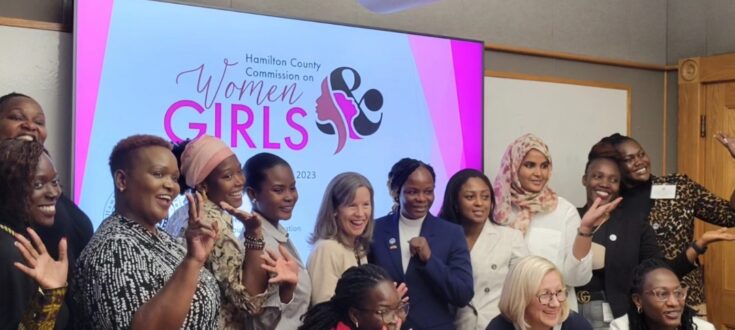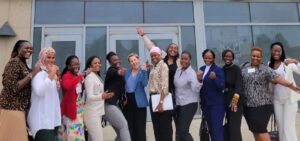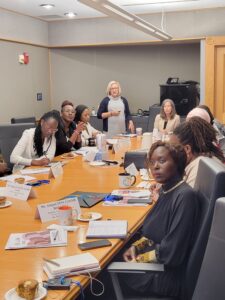Women, Peace, and Security: Reframing our Region’s Future

October 4th-10th, the World Affairs Council hosted twelve female delegates from the countries of the Central African Republic, Haiti, Kenya, Mali, Mauritania, Sāo Tomé and Príncipe, Sierra Leone, South Sudan, and Togo. These delegates had been selected by the U.S. State Department to participate in a Special Initiative exchange on Women, Peace, and Security.
What is the Women, Peace, and Security Special Initiative and why is it so important?
Women, Peace, and Security (WPS) is a policy framework that recognizes that women must be critical actors in all efforts to achieve sustainable international peace and security. WPS promotes a gendered perspective and women’s equal and meaningful participation in peace processes, peacebuilding, and security.
According to the United States Institute of Peace, the WPS national strategy outlines four primary lines of effort:
The WPS national strategy outlines four primary lines of effort:
- Seek and support the preparation and participation of women in decision-making processes.
- Promote the protection of women’s and girls’ human rights.
- Adjust U.S. international programs to improve equality and empowerment outcomes for women.
- Encourage partner governments to adopt similar WPS focused plans.
If this is the overarching national strategy, how does that relate to Cincinnati and Northern Kentucky?
Cincinnati and Northern Kentucky are leaders when it comes to female leadership. Over the course of two days, the delegates met with Kentucky Representative Rachel Roberts, the Hamilton County Commission on Women and Girls, Ohio Representative Cindy Abrams, Women Helping Women, and the Winton Woods Academy of Global Studies.
Here are a few highlights from their program!
Kentucky Representative Rachel Roberts
Representative Rachel Roberts is of the Democratic Party in the Kentucky House of Representatives. She currently holds the title of Minority Whip, which means she is the second highest-ranking individual in the minority party.
This is the second time she has met with international professionals through World Affairs Council Exchanges. She is enthusiastic to tell her story.
Representative Roberts is the 1st woman to hold the title of Minority Whip in the Kentucky House of Representatives and the 5th in the entire state government to sit in a seat of power. As she explained to the delegates, “When women lead, there’s more consensus, more compromise, and more peace.” She ran when she realized she had the capacity to lead. Her goal as the 1st female Minority Whip is to create a place for women after her. In her words, “If people don’t step up, we will have what we have always had.”

Representative Rachel Roberts (center) with delegates.
A common obstacle for women to apply for positions is that women will only apply if they believe they meet 90% of the qualifications. Meanwhile, men will apply if they meet on 60%. Therefore, it is incredibly important to encourage women to run. It is incredibly import encourage women to lead and remind them that they are qualified. It is equally important to set women up in places where they will succeed while also giving them room to fail. It is in our failures that we grow.
“Stepping up to lead is an act of bravery,” Representative Rachel Roberts said. Especially in places like Kenya where, culturally, it is not acceptable for women to lead. One of the delegates from Kenya said that often men will resort to mudslinging to discredit women.
In her final words to our delegates, Representative Roberts left us with these wise words:
“Be the person to plant seeds of light in (the) darkness and be okay that we might not see them germinate and grow until after we are gone.”
Hamilton County Commission on Women and Girls
The Hamilton County Commission on Women and Girls, led by Commissioner Denise Driehaus, was a very informative meeting for the delegates. The Commission was formed to give women a seat at the table, a powerful platform to help turn rhetoric into action. The Commission on Women and Girls is made of 20 women who serve 2-year terms and 10 high school girls who serve 1-year term. The Commission makes recommendations to the Board of County Commissioners and local government jurisdictions to eliminate any distinction, exclusion, or restriction made on the basis of sex which has the effect or purpose of impairing or nullifying the recognition, enjoyment or exercise by women, irrespective of marital status, on the basis of equality between men and women, of human rights or fundamental freedom in the political, economic, social, cultural, civil, or any other field.
For our delegates, dating safety was one of the main pillars of the Commission that they were impressed with. Several of our delegates from Kenya, South Sudan, and the Central African Republic were interested to create an exchange with the Commission on Women and Girls to start, and navigate, the conversation about healthy relationships and boundaries in schools. This is important because in countries, like South Sudan, schools don’t go into detail about how girls can protect themselves. Programs that do are very limited.

Commissioner Driehaus and Mary Maune speaking with delegates.
Another pillar in which the delegates were highly interested in was health and safety. Effective October 3rd, 2023, new legislation gives women and girls access to period products in all school and public county buildings. Commissioner Driehaus states that, “Ohio will join the fast-growing number of states recognizing that menstruation is a natural body function, and the health and educational experience of girls and young women will be improved by providing direct access to period products in school the same way they now access toilet paper, soap, and paper towels.”
It was not an easy conversation to have in Ohio initially, but the Commission had to make a case in a way that their male colleagues could understand. It is a health, educational, and economic concern. Girls were missing school or getting sick from reusing menstrual products for days. Due to their absences from school, girls were missing out on their education and an opportunity to create an economic future for themselves. It also robbed them from becoming leaders when they were unable to join their peers at school.
Delegates from the Central African Republic was very impressed that the Commission on Women and Girls was able to accomplish this. She said that resource scarcity of menstrual products is a problem in her country. However, she would like to invite the Commission on Women and Girls to speak with the parliament about the leaps and bounds that they have made here.
What’s Next?
Women’s leadership is incredibly important to moving our region forward. In our next blog, we will look at how Ohio Representative Cindy Abrams and Women Helping Women fits into the Women, Peace, and Security policy framework within Cincinnati and Northern Kentucky.


